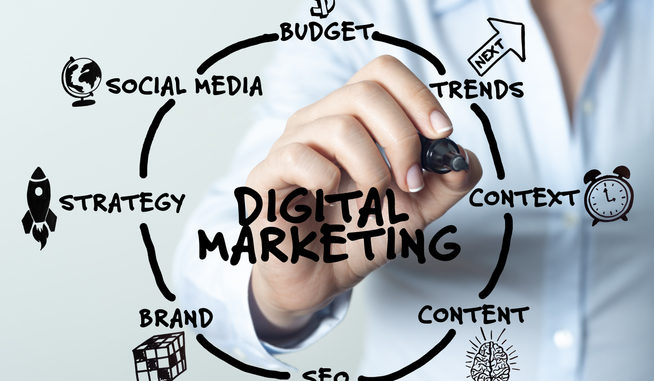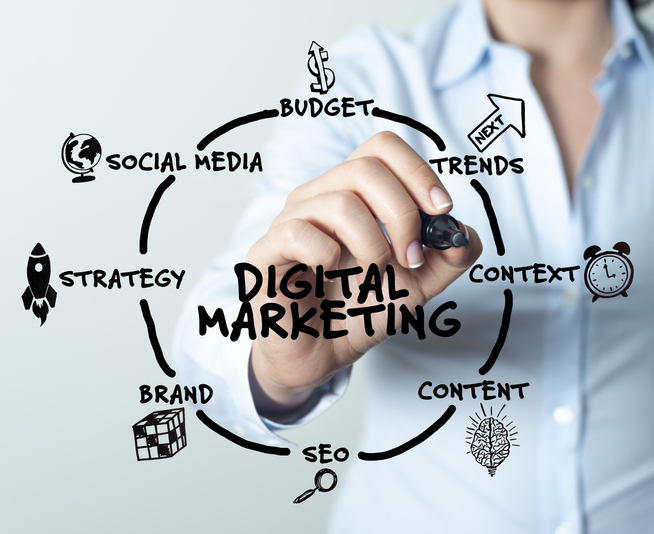
As we’re all stuck inside because of COVID-19, digital channels are actively changing the way we research, find and buy things – whether that thing be a good, or service or simply information. One thing that is definitely certain, however, is that contemporary commerce will never look the same again, and it’s in the best interest of your business to get on board before the ship sails completely.
All Digital Strategies Are Not Created Equal
Despite greater need than ever for a digital presence, rushing into the online space unprepared is not necessarily the best idea. It is not enough to simply throw up a website – success online requires planning and creating a digital marketing strategy and committing to it to achieve results.
 The truth about digital marketing is that it is very easy to get your product or service online, but you need to connect your business with consumers. This only can happen if you have the right information in your digital ads and web presence – an important part of the strategizing process sometimes overlooked by quick-fix agencies promising cheap, fast results. In fact, News Generation summarized the 2018 Nielsen Digital Ad Ratings Benchmark Report, which found that only 59 percent of online mobile campaigns reached their intended targets, highlighting a shocking amount of unresearched and totally unprepared initiatives being pushed out in recent years.
The truth about digital marketing is that it is very easy to get your product or service online, but you need to connect your business with consumers. This only can happen if you have the right information in your digital ads and web presence – an important part of the strategizing process sometimes overlooked by quick-fix agencies promising cheap, fast results. In fact, News Generation summarized the 2018 Nielsen Digital Ad Ratings Benchmark Report, which found that only 59 percent of online mobile campaigns reached their intended targets, highlighting a shocking amount of unresearched and totally unprepared initiatives being pushed out in recent years.
Instead, when considering an agency for a digital marketing strategy, you should be looking for a few aspects of their pitch that signal credibility and preparedness.
First, it is important they actually understand your business, how it operates and makes money. A quality agency will do research on the business they’re pitching and will take steps to really know what has been working, what hasn’t and how they can help. The agency you decide on for digital marketing strategy should also be providing competitor research, which can give you insight on the current digital landscape within your industry, the platforms on which your competition advertises, a look at what’s working and ways you can stand out from the rest of the pack. You may also want to inquire about the extent of their experience in the digital realm and their past clients so you can get a taste of their work and capabilities.
Making sure the agency you choose can check boxes like this will help you know you’re partnering with someone who is prepared, competent and ready to help you grow your business online.
The Rise of Ecommerce
In both B2B and B2C markets, remote work and ecommerce have been slowly making inroads for years as viable alternatives to classic brick-and-mortar operations. However, in the wake of the coronavirus crisis, so many more businesses have moved online, resulting in a second sort of gold rush for those businesses that have made the transition to online working and sales successfully.
With social distancing now the norm – and poised to possibly be for some time to come – being able to work and sell online is vital. This is true whether you sell products or services, with more and more consumers choosing to book appointments or buy directly from a website. Is your online presence up to the task?
 The cornerstone of a successful approach to selling online – regardless of what you offer – is a good website. Your site needs to be able to securely accept online orders, integrate with your inventory system or booking platform, and provide users with confidence that their request was successful through a web or email confirmation. If your website can’t fulfill orders, you’re missing out on sales to your competitors who can sell or book online.
The cornerstone of a successful approach to selling online – regardless of what you offer – is a good website. Your site needs to be able to securely accept online orders, integrate with your inventory system or booking platform, and provide users with confidence that their request was successful through a web or email confirmation. If your website can’t fulfill orders, you’re missing out on sales to your competitors who can sell or book online.
However, you also need people to find your site. It isn’t as simple as “build it and they will come” with the web – instead, you need to invest in the right digital marketing channels to grow your visibility. But what is best will depend on a number of different factors.
Channel Surfing – Marketing Edition
Choosing the right marketing for your business depends on a number of different factors. Is your business unique in your area or facing a competitive marketplace? Do you sell products or services that people know of or are you delivering a solution to a problem people may not know exists? Is your service something people can see or measure in a realistic and tangible way? All these factors can help decide the best options for your business.
SEO
Search engine optimization is one of the oldest ways to help increase your business’ visibility online, but is a slow and steady process more than a quick one. By improving the quality of content on your site, the relevance of your site for particular keywords and location-related searches, and your site’s overall user experience – among many other more subtle factors – SEO works to make your site appear higher in relevant searches on Google, Bing and other sites. In turn, this drives more traffic to your site to increase awareness and sales.
Pay-Per-Click
Whereas SEO is the long-term play to get a high position in search results, PPC moves faster at the expense of a paid budget. Search PPC ads appear above organic results for targeted search queries, allowing you to appear when people search for specific phrases – or even for your competition. You also only pay when someone clicks your ad, meaning you directly pay out for visits to your site. However, how much reach you get depends on how competitive the marketplace is for your keywords. Plus, you only stay at the top this way for as long as you pay – once you stop, so does the traffic. That said, this channel is good for new sites or those looking to expand visibility overall, sites that are new and still working on their organic visibility, or as a way to get your business to show up in searches for a competitor’s brand.
Banner Ads
Another option is banner ads, which have also long been a staple of digital advertising. These appear as static or moving images on other websites, such as news sites or directory platforms. With targeted placement, you can get banner ads on sites that are relevant to your target audience – much like buying TV or radio placements to align with programming that aligns with your audience demographics. Plus, like PPC advertising, these ads are often charged on a per-click basis, giving you some of the brand exposure element of a billboard as well.
Social Media (Organic)
Organic social media marketing relies on keeping your brand’s accounts on networks like Facebook, Twitter and LinkedIn relevant and engaging. Businesses face an uphill battle with organic social alone as these platforms are pushing more and more to charge companies to make their postings visible to a broader audience. With organic, we typically recommend at least a small investment in boosted postings, which help to increase the reach of your post and even grow the audience of people who like your page, to help increase who sees what you put on the social networks.
Social Media (Paid)
Paid social media, on the other hand, bypasses some of the visibility limits and allows you to reach a broader audience. Paid ads on social media offer some targeting abilities to reach a more relevant audience based on demographic and geographic factors. Plus, paid social content can be seen by those who don’t follow your page, expanding your visibility dramatically over organic posting alone.
Moving Forward with Digital Marketing
Proceeding with digital marketing is often multifaceted and evolves, incorporating different elements and channels at different times. That’s why working with a marketing partner with the ability to handle your messaging and needs across different channels is vital for your success.
At JFG, we handle all aspects of digital marketing and can help you put together a strategy to work for your business. We work to deliver results with your marketing budget and help your company grow sales and find success, whether you’re new to online sales or looking to increase your current business. Find out how we can help and get the conversation started by contacting us today.
